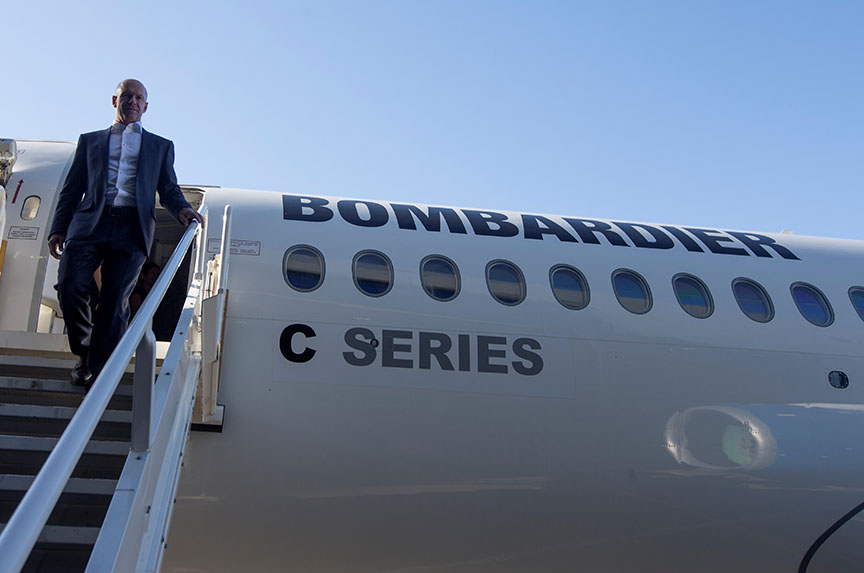
US International Trade Commission’s ruling boosts Canadian prime minister
The surprise ruling by the US International Trade Commission (USITC) in favor of Canadian aerospace manufacturer Bombardier over Boeing, a US firm, should come as a relief to Canadian Prime Minister Justin Trudeau whose government has been caught between domestic politics and US President Donald J. Trump’s protectionist trade agenda.
Many observers had believed that the USITC would bow to pressure from Trump’s “America First” worldview and rule against the Canadian manufacturer, which Boeing accuses of dumping C-Series jets on American markets. Instead, the USITC on January 26 rejected imposing heavy duties on the sale of Bombardier’s newest jet to US airlines.
The ruling allows Trudeau, who is up for re-election in 2019, to tout his record on jobs at home and portray himself as standing up for Canadian interests. He can now go before crucial voters in Central Canada with a victory under his belt, solve a sticky appropriations dilemma in Ottawa, and, with the right spin, present Trump with a positive example of US-Canada trade at a critical point in the renegotiation of the North American Free Trade Agreement (NAFTA).
As stocks of Bombardier climbed by 15 percent, it was not just the brokers in the Toronto Stock Exchange cheering the USITC ruling. Bombardier provides thousands of well-paid, middle-class jobs to Canadians in crucial electoral districts across Ontario and Québec.
Trudeau making good on his promise to protect manufacturing jobs boosts his prestige and undermines electoral challenges from Conservatives in Ontario and the Bloc Québécois, who rely on these workers for votes.
The ruling also saves Bombardier, whose recent woes are well-documented, from a collapse that would have caused ripples throughout the Canadian economy.
The setback for Boeing could also pave the way for reconciling an appropriations fiasco that is boiling in Ottawa. As a result of the Bombardier dispute, Trudeau followed through on threats to ditch a deal with Boeing to update Canada’s aging fleet of F-18 warplanes, which has been the mainstay of the Royal Canadian Air Force. Instead, the prime minister has committed to buying surplus Australian versions of the jet for almost $388 million.
The move, which comes two years after Trudeau’s Liberals scrapped a controversial deal to buy state-of-the-art but costly F-35 jets, has opened Trudeau up to attacks from the right. A rapprochement with Boeing could help the Liberals shore up Canada’s air force and maintain interoperability within NORAD at a time when Russia is increasingly asserting itself in the Arctic.
Any new purchase order of modern F-18, F-35, or Advanced F-15 jets from the United States would certainly please Trump as he calls on diplomats to cajole foreign militaries to “Buy American.” Indeed, with some savvy spin, Trudeau can portray the entire Bombardier-Boeing dispute as a win for the United States and “fair trade.”
A recent deal between Airbus and Bombardier will move the production for US market C-Series planes to Alabama, creating the kind of manufacturing jobs that Trump has promised to bring back to the United States. A quick win on jobs, particularly in a state that just embarrassingly—for Trump and his Republican Party—elected its first Democratic senator in twenty-five years, would be a boon for the president.
Canada and Trudeau have much to gain if they can capitalize on Trump’s need to tout his record in the midterm elections this year. Good feedback from Trump’s base gives Trudeau the opportunity to impress a positive vision of NAFTA upon Trump—one where Canadian firms are actively investing and creating jobs in the US market. Highlighting any perspective where the United States is “winning” on trade and producing jobs will be integral to dampening the current administration’s dim view of the crucial free trade agreement.
As Trudeau continues his high-level efforts to engage Trump, the Bombardier-Boeing dispute does not need to be a thorn in the side of that relationship. Despite what appear to be fundamental differences in their philosophies, Trudeau and Trump both desire growth, trade, and investment. If Trudeau can use the positive, job-creating aspects of Bombardier’s C-Series program as a way forward, he will be able to considerably smooth the path to a successful renegotiation of NAFTA. Considering the dire stakes for both countries should NAFTA fail, a successful renegotiation would cement Trudeau’s legacy as a statesman more than any small trade victory at home.
James Wholley is a program assistant in the Atlantic Council’s Africa Center. Follow him on Twitter @jameswholley.
Image: Alain Bellemare, president and chief executive officer of Bombardier Inc., walked off a C Series plane at Bombardier's plant in Mirabel, Canada, on October 20, 2017. The US International Trade Commission on January 26, 2018, rejected imposing heavy duties on the sale of Bombardier's C Series plane to US airlines. (Reuters/Christinne Muschi)

